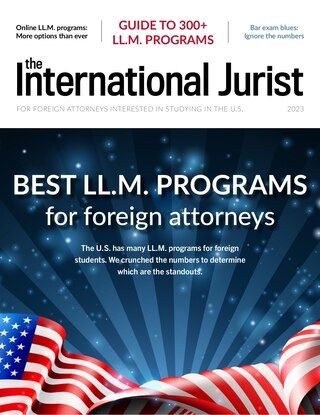Preparing for your LL.M., mastering it, and then knowing what to do with the degree after graduation are challenges in their own right. In addition, foreign LL.M. students and graduates have to be on top of their visa status. The most common trajectory for a foreign LL.M. is to begin with a student visa (F1), move to the Optical Practical Training (OPT), and hopefully to an H1B, for those who wish to complement the study with work experience beyond the OPT.
This article will give an overview of the path from F1 to OPT to H1B. U.S. immigration law is a complex topic and obviously there is great diversity with regards to visa status. The following is an overview and encourages further education.
Welcome to the U.S. – Your Student Visa (F1)
An F1 visa is a non-immigrant visa, a visa for those who wish to study in the U.S. on a temporary basis.
Application
After a U.S. law school has accepted you for admission to the LL.M. program, the school will send you an I-20 form, which is the application for your F1 visa. There will be an application fee and documents to fill out, followed by a visa interview.
During Your LL.M.
After you have been approved for your F1 visa, you will able to enter the U.S. as an international law student. However, you will need to stay aware of your obligations as an F1 visa holder. A visa violation is not a walk in the park. You must remain enrolled full-time and you absolutely have to go to class and maintain passing grades. F1 visa students are not allowed to work off-campus. You may, however, work on-campus or under the Curricular Practical Training (CPT) option, if you qualify.
Everyone should ensure compliance with the law. If you do not maintain your valid F1 visa status, you will not be allowed to return to the U.S. should you leave, and you will not be eligible for OPT, CPT or on-campus employment.
After Your LL.M.
After completing your LL.M., you have 60 days to leave the U.S. Should you wish to remain in the U.S., you will need to enroll in a higher program or apply to change your visa status.
Let’s Go to Work – Your Optional Practical Training (OPT)
OPT is temporary employment that is directly related to your major field of study, in our case, law.
Application
LL.M. students must apply for OPT before completion of all work toward the LL.M. degree. The application can take about 3 to 4 months to get approved, so you have to plan ahead. In order to be able to apply for OPT you must have been enrolled for at least 9 months, currently be in F1 status, in good academic standing, and not have used more than 12 months of OPT in the past at your current degree level. However, you do not need to have a job offer in order to apply for OPT.
Choosing a start date for your OPT takes some consideration. As a guideline it is suggested that if you have a job offer, start early. If you are still searching, start later. But you should talk to the international office at your law school to find the right time frame for you. One important limitation is that your start date cannot be more than 60 days after your LL.M. program end date.
During Your OPT
The OPT lasts a maximum of 12 months. You can use your OPT before you finish your program (Pre-Completion OPT) or after you finish your program (Post-Completion OPT). You can also use a combination of the two, as long as the total amount of OPT does not exceed 12 months. The job you seek can be paid, unpaid, or contract as long as it is directly related to your major field of study, law. Your degree must be essential for that position. You can stay in the U.S. under OPT for up to 90 days unemployed, but after that, your OPT and F1 status ends.
After Your OPT
After your OPT expires, you have 60 days to leave the U.S., unless…
Let’s Stay a Little Longer – Your Professional Occupation Visa H1B
The H1B allows a foreign worker to come to the U.S. and work in a “specialty occupation,” which includes most professional positions such as attorney.
Application
In contrast to the visas above, only a U.S. employer can file an H1B petition, not you. This means you have to have a job offer in order to have a chance of getting the H1B. Why am I saying, “have a chance”? To make matters complicated, there is a limit on the number of new H1Bs that can be issued each U.S. fiscal year; 65,000 plus 20,000 for U.S. graduates with a master degree or higher, which includes the LL.M. To put these numbers into prospective, this year, the government received 233,000 applications. The odds of receiving an H1B were, therefore, 34 percent. If you take into consideration the difficulty of finding an employer who is willing to sponsor that visa for you in the first place, it becomes clear how tough of a battle you must be prepared to fight.
So, which of the 233,000 petitioners will receive one of the available visas? This is determined by sheer luck; through a computer generated lottery conducted each year in April.
During Your H1B status
If you were the lucky winner of an H1B, you can generally start working by October 1st of the same year you petitioned for the H1B. The question then is, what happens in between April and October if your OPT is over? The so-called cap-gap extension comes to rescue. A cap-gap extension allows LL.M. graduates with pending or approved H1B petitions to remain in the U.S. during the “gap” between April and October.
The total period of U.S. stay available on H1B status is six years. The H1B is originally granted for three years, at the end of which period extension is available for an additional three years.
After Your H1B status
After spending six years in the U.S. on H1B status, the foreign attorney must leave the U.S. and remain overseas for one year before he or she can be given another H1B visa to enter the U.S. again.
Summary
Talking about three different visas in such short space has its limitations. Hence, nothing should be seen as legal advice. Everyone should make sure to understand applicable visa requirements to ensure that relevant status is properly maintained.
With all these things to worry about, it is easy to forget to enjoy the stay in the U.S. and your LL.M. study. It is a wonderful experience and the entire headache will one day be part of an amazing adventure.
Desiree Jaeger-Fine, Esq, is a regular contributor to The National Jurist and principal of Jaeger-Fine Consulting, LLC, The Hub for Foreign Legal Talent™ – helping foreign lawyers seek employment in the U.S.






